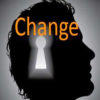Today we are revisiting the topic of change. They are even now researching the strange biases the brain displays regarding this topic. For most people, at any given time, they feel like they have arrived or gotten as far as they are able to go on any of life’s paths. When you ask people about what’s new in their life, what do they most often say?
‘Not much.’ It’s a factually inaccurate statement, more reflective of mental habit than genuine observation. Change is so pervasive that it becomes invisible. Not only do we naturally have a tendency to see ourselves as at the end of our proverbial road, but they have also explored a phenomenon called change blindness. Everyone heard of it?
Nope, but it sounds fascinating.
We often think ‘this is it’ about our life.
Well, there are two relevant ideas though they haven’t yet connected them. They have discovered the mechanism in which the eye manages incoming data. It takes a total snapshot of anything you might have looked at only a small percentage of the time. It keeps that with only small modifications to show that anything has changed. It updates the old image when, say, the persons limb moves, but only with the specific item. If you noticed the moving arm, you may not catch that they have stepped backward a bit also.
So, we tend only to “notice” those parts of the image that change? We seem to be always checking ‘has it changed’? Yes.
Now let’s overlap that mechanism with how the brain acquires new information. Any new information is synthetic. Your brain will not, actually cannot, create new patterns for every learned thing. Even in the case of infants, the behaviour of their neurons has an observable pattern, inherited predispositions, like sensitivity to distress for example.
My own development was characterized not by the presence of some inclinations, but the weakness or even absence of some key functional traits, like facial seeking and affinity. So even if parts of that information are left blank, you still have something that shapes the persons awareness of the so called real world. The point is, you don’t see the present moment or concrete reality. You see only bits of the past. More specifically, you see bits of memory. Even outside of the mental milieu, light and synaptic response, both create delays.
Your brain has plenty of chances to fill in the blanks, and does without fail. In my case with the internal blank spots, the world just winds up looking sort of abstract to me, cubist, metaphorically speaking. Neurotypical perception would be more like impressionist art, generalized. How this relates to change blindness is the bulk of your mental frames are filled in by your mental functions, unconscious assumptions.
So, our brains are only capable of looking in the rear-view mirror? Ultimately, or so it would seem on the surface. It’s how things seem to mainstream science. Your brain only adds sensory data to mental assumptions periodically, like a software patch. The whole picture captures are functionally like user identification software. They serve only to register initial identity on any new instance of exposure. Captchas, I think they’re called.
It often needs crisis or a push of some kind to update.
Your brain and senses are momentarily startled by any new information. That’s what triggers the initial holistic impression. Then the brain becomes habituated.
Now to show this from the human experience perspective, they have set up experiments where a person off the street was introduced to a test environment. They were not inconvenienced in any way, but they were each time momentarily distracted, and while they were distracted the person they were interacting with was switched. The new person behaved with all the knowledge and awareness of the person they were substituting for. They knew the persons name and what they wanted, but they looked entirely different. The majority of people didn’t even get a vague impression of anything being off. Those who did register that something was off couldn’t identify what it was. See how this illustrates my previous information in action?
I’ve noticed that when something registers without any specific event causing it, I have a hard time figuring out if it’s changed or if it was always like that. It’s disorienting.
Your thoughts are welcome. Be well friends.
Travis Saunders
Dragon Intuitive
~science,mysticism,spirituality~



Leave a Reply